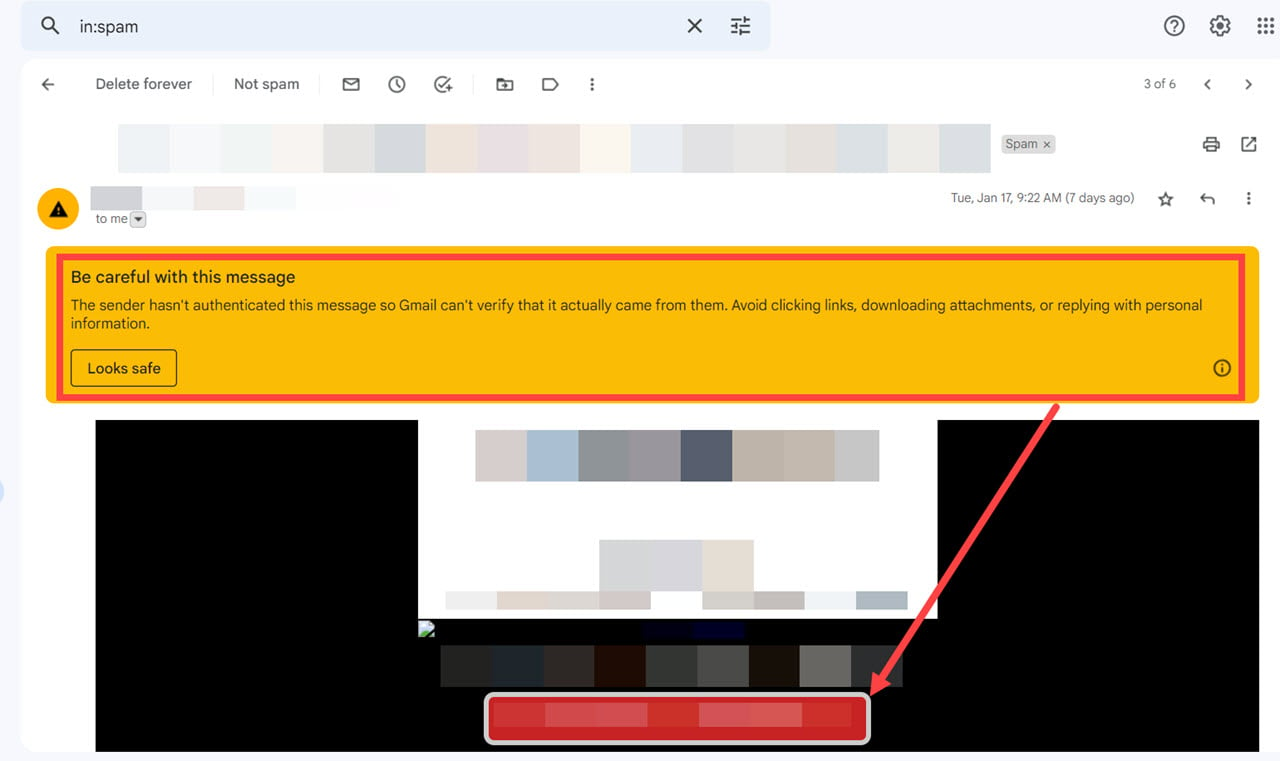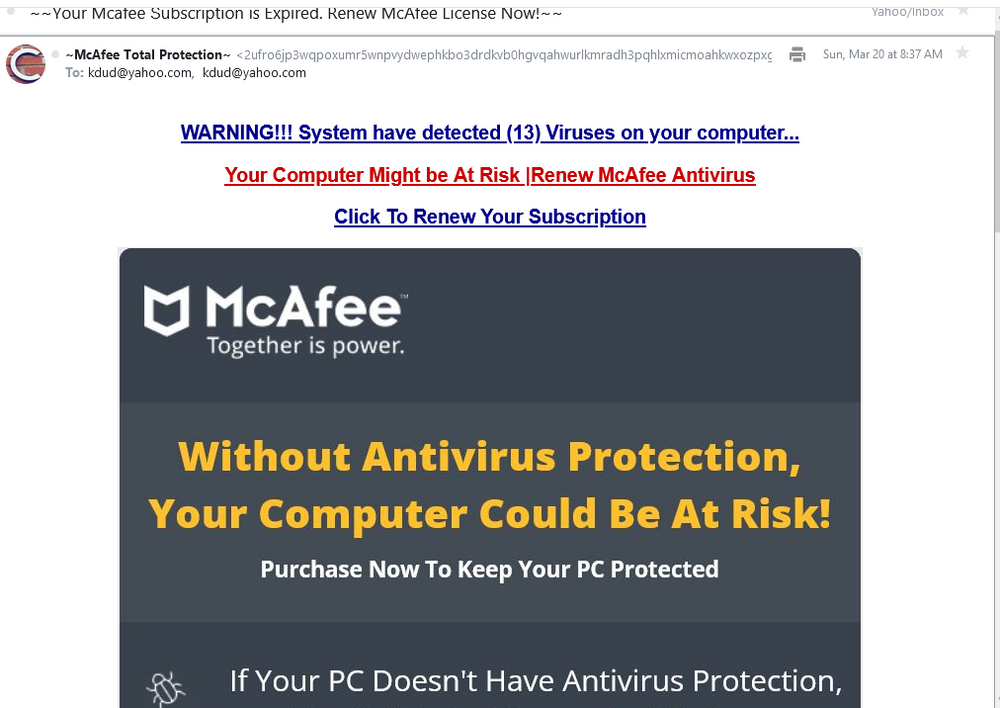McAfee Scam Email 2023: How To Spot And Stay Safe
It's 2023, and cybercriminals are getting smarter. McAfee scam emails have become one of the most common ways hackers try to trick people into giving away their personal information. But don't panic—armed with the right knowledge, you can easily spot these scams and protect yourself. In this article, we'll break down everything you need to know about McAfee scam emails in 2023.
Imagine receiving an email that looks legit—complete with McAfee branding, logos, and even language that sounds official. You might think it's from a trusted source, right? Wrong! Scammers are using these tactics to fool unsuspecting victims into clicking malicious links or handing over sensitive data. It's time to stay one step ahead.
Let's dive into the world of McAfee scam emails, uncovering the tricks scammers use and sharing actionable tips to keep your digital life secure. Whether you're a tech enthusiast or just someone trying to stay safe online, this guide has got you covered. So grab a coffee, and let's get started!
Read also:How Many Bodies Does King Von Have Unveiling The Truth Behind The Numbers
What Are McAfee Scam Emails in 2023?
McAfee scam emails are fraudulent messages designed to mimic legitimate communications from McAfee, a well-known cybersecurity company. These emails often claim there’s an issue with your subscription, account, or software, urging you to take immediate action. But here's the catch—they're not from McAfee at all.
In 2023, scammers have stepped up their game, using advanced techniques to make these emails look incredibly convincing. From fake invoice notifications to urgent alerts about "expired licenses," these scams can trick even the savviest users if they're not careful.
Why Should You Care About McAfee Scam Emails?
These scams aren't just annoying—they can be downright dangerous. By clicking on malicious links or providing personal information, you could expose yourself to identity theft, financial fraud, or malware infections. In fact, according to a report by the Federal Trade Commission (FTC), phishing attacks like McAfee scams accounted for over 50% of all reported fraud cases in 2022.
Here's why you should care:
- They target your sensitive data, such as passwords and credit card numbers.
- They can install harmful software on your device without your knowledge.
- They often lead to larger-scale attacks, affecting not only you but also your contacts.
How to Identify McAfee Scam Emails
Spotting a scam isn't always easy, but there are telltale signs that can help you differentiate between a genuine email and a fake one. Here's what to look out for:
Check the Sender's Email Address
Legitimate McAfee emails will always come from official domains like "@mcafee.com." Scammers, however, often use similar-sounding addresses, such as "@mcafee-support.com" or "@mcafee-secure.com." Take a closer look at the sender's address before trusting the email.
Read also:Jenna Ortega Leaks The Truth Behind The Hype And Sensationalism
Look for Urgent Language
Scammers love to create a sense of urgency to pressure you into acting quickly. Phrases like "Your account will be suspended!" or "Immediate action required!" are red flags. Genuine companies rarely use such alarming language.
Examine the Content and Formatting
Pay attention to spelling, grammar, and overall formatting. While no one's perfect, official emails from reputable companies are usually polished and error-free. If you notice typos or awkward phrasing, it's probably a scam.
Common Types of McAfee Scam Emails in 2023
Scammers have a variety of tactics up their sleeves. Here are some of the most common types of McAfee scam emails you might encounter:
Expired Subscription Alerts
This type of email claims your McAfee subscription has expired and urges you to renew immediately to avoid losing protection. The link provided usually leads to a fake website designed to steal your payment details.
Fake Invoice Notifications
These emails pretend to inform you about a recent purchase or subscription renewal. They often include an attachment or link to "view the invoice," which may contain malware or redirect you to a phishing site.
Security Alert Scams
Pretending to notify you of a potential security threat, these emails ask you to click a link to "resolve the issue." In reality, the link may download malicious software onto your device.
Tips to Protect Yourself from McAfee Scams
Now that you know what to look for, here are some practical tips to stay safe:
- Never click on links or download attachments from suspicious emails.
- Verify the authenticity of the email by contacting McAfee directly through their official website.
- Enable two-factor authentication (2FA) for added security.
- Keep your antivirus software up to date to detect and block potential threats.
- Educate yourself and your family about common phishing tactics.
Real-Life McAfee Scam Examples in 2023
Let's take a look at a few real-world examples of McAfee scam emails reported in 2023:
Example 1: The "Subscription Renewal" Scam
One user received an email claiming their McAfee subscription had expired. The email included a link to "renew now" and promised a special discount. Upon investigation, the user discovered the link directed to a fraudulent site.
Example 2: The "Account Verification" Scam
Another victim received an email stating their McAfee account needed verification due to suspicious activity. The email contained a form asking for personal information, including Social Security numbers and banking details.
How to Report McAfee Scam Emails
If you receive a suspicious email claiming to be from McAfee, it's important to report it. Here's how:
Report to McAfee
Forward the email to spam@trusteer.com, McAfee's dedicated spam reporting address. They'll analyze the email and take appropriate action against the scammers.
Report to Your Email Provider
Most email services, such as Gmail and Outlook, have built-in tools to report phishing attempts. Use these features to flag the email and warn other users.
Report to Authorities
In addition to reporting to McAfee and your email provider, consider filing a complaint with local law enforcement or agencies like the FTC.
McAfee's Stance on Scam Emails
McAfee takes scam emails very seriously and actively works to combat them. They regularly update their systems to detect and block phishing attempts and provide resources to help users stay safe. According to McAfee's cybersecurity experts, staying informed and vigilant is key to avoiding scams.
Future Trends in Cybersecurity Scams
As technology evolves, so do the methods used by scammers. In 2023 and beyond, we can expect to see more sophisticated phishing techniques, including AI-generated content and deepfake technology. Staying informed and adapting to these changes will be crucial for maintaining online security.
Conclusion
In 2023, McAfee scam emails remain a significant threat to individuals and businesses alike. By understanding how these scams work and implementing preventive measures, you can protect yourself and your data. Remember, if something seems too good—or too urgent—to be true, it probably is.
Take action today by educating yourself, reporting suspicious emails, and sharing this article with others. Together, we can make the internet a safer place for everyone. Got questions or thoughts? Drop a comment below and let's chat!
Table of Contents
- What Are McAfee Scam Emails in 2023?
- Why Should You Care About McAfee Scam Emails?
- How to Identify McAfee Scam Emails
- Common Types of McAfee Scam Emails in 2023
- Tips to Protect Yourself from McAfee Scams
- Real-Life McAfee Scam Examples in 2023
- How to Report McAfee Scam Emails
- McAfee's Stance on Scam Emails
- Future Trends in Cybersecurity Scams
- Conclusion



